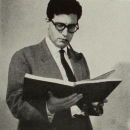Sham bam bamina! posted:That's not Death of the Author; that's people being mad on the Internet (and forgive me if I think that this reaction looks like a straw man). I've seen similar analyses made with more traditional works and authors (Arthur Conan Doyle - for example, based on some lines in "The Adventure of The Yellow Face"), but I chose an example where the author has made very clear intent -and apologies-, and one where there is supporting evidence to support the claim that it was unintended - among other things, the rules he wrote for his forum classified transphobia as hate speech when the issue wasn't a matter of widespread public debate.
|
|
|
|
|

|
| # ? Jun 4, 2024 18:43 |
|
Setting aside the whole "angry people on the internet" aspect of that example, Death of the Author would seem to me to imply that if you were viewing the work critically, then you would absolutely not treat some random person on the internet's interpretation of it, either individual aspects or the whole, as being in any way more valid or all-encompassing as the author's interpretation of the work. People have been saying Lolita has promoted pedophilia and that its treatment of Humbert Humbert is too sympathetic and discounts it as a "real" work of literature out-of-hand. You can choose to ignore that opinion in your own interpretation of Lolita if it doesn't resonate with your experience of the book. I don't see how it would be different for a webcomic. (except I kind of do, because as much as I enjoy webcomics, the creators frequently make tone-deaf or tasteless jokes, and OotS is by no means exempt. That aside, whether or not the creator "took the criticism and improved" is irrelevant when you're approaching the work itself from a critical perspective. I think anyone is capable of having a critical, interpretive opinion of a work that is separate from their opinion of the social consciousness of the author or suitability of its humor. It's not a good argument against Death of the Author as a critical tool.)
|
|
|
|
|
There is no existant form of critical interpretation that says a work that is offensive is not offensive because the author didnt mean it to be
|
|
|
Gnoman posted:I've seen similar analyses made with more traditional works and authors (Arthur Conan Doyle - for example, based on some lines in "The Adventure of The Yellow Face"), but I chose an example where the author has made very clear intent -and apologies-, and one where there is supporting evidence to support the claim that it was unintended - among other things, the rules he wrote for his forum classified transphobia as hate speech when the issue wasn't a matter of widespread public debate. Doesn't really matter. The example that tends to sell the concept to the Kids These Days is Rowling's post-everything announcement that Dumbledore was secretly gay the whole time. No he wasn't, because there's nothing at all in the text to indicate it. What Rowling's subjective personal authorial intent was is irr-elephant. If you, as a reader, want to do a gay reading of Harry Potter, you can, and you can talk about Gay Dumbledore in that context if you want to, but you don't have to, because Gay Dumbledore isn't a part of the text and can thus be ignored. Similarly, in the above example with cross-gender lizard boobs or whatever, if people were offended, then they were offended; full stop. "If someone says you hurt them, you don't get to decide you didn't." Intent and effect are distinct, and so are the writer and the reader. Innocent intent can still harm. Hieronymous Alloy fucked around with this message at 22:33 on Mar 19, 2019 |
|
|
|
|
Gnoman posted:He didn't try to correct how people see it - he took the criticism, decided that those two jokes probably were not good, and resolved to avoid the subject in the future. From what I gather in the Barthes essay he’s saying that given all the possible conscious and unconscious influences on the author, the stuff, and the viewer, it’s impossible to have a concrete definition of intent; because there is no concrete definition of intent there is no One True Way to interpret a work; because there is no One True Way to interpret a work the primary relationship is then not the author to the work or the author to the reader, but of the reader to the work.
|
|
|
|
idiotsavant posted:because there is no One True Way to interpret a work the primary relationship is then not the author to the work or the author to the reader, but of the reader to the work. Yup
|
|
|
|
Yeah, Lolita is a work I struggle with in this regard; I feel like it's obvious even within the work that Humbert is full of poo poo and a vile child rapist, particularly when he himself has this revelation at the end, and I could go off on a long rant about how alternate readings are largely a product of our culture's grotesque willingness to permit "educated/artistic" middle-aged men to sexualize and abuse adolescents, but other readings are so common that I don't feel comfortable yelling YOU'RE WRONG AND PROBABLY A SHITHEAD at people about them. Well, I am comfortable with that, but I probably shouldn't be. Like I said, struggles.
|
|
|
MockingQuantum posted:People have been saying Lolita has promoted pedophilia and that its treatment of Humbert Humbert is too sympathetic and discounts it as a "real" work of literature out-of-hand. You can choose to ignore that opinion in your own interpretation of Lolita if it doesn't resonate with your experience of the book. On the other hand, when the erroneous interpretation is being used to justify widespread suppression of the work in a specific context - Lolita is commonly a title where people try to remove from libraries, prohibit discussion in academic circles, and some retailers have outright refused to sell it - it becomes a major problem. Books that are open to such interpretations usually have something very valuable to say (in the case of Lolita, an obvious interpretation is how easy it is to delude yourself into thinking that a woman wants you, which is a ludicrously relevant message in 2019), and not being willing to oppose such objections is harmful to society as a whole.
|
|
|
|
|
Gnoman posted:On the other hand, when the erroneous interpretation is being used to justify widespread suppression of the work in a specific context - Lolita is commonly a title where people try to remove from libraries, prohibit discussion in academic circles, and some retailers have outright refused to sell it - it becomes a major problem. Books that are open to such interpretations usually have something very valuable to say (in the case of Lolita, an obvious interpretation is how easy it is to delude yourself into thinking that a woman wants you, which is a ludicrously relevant message in 2019), and not being willing to oppose such objections is harmful to society as a whole.
|
|
|
|
Georgia O’Keefe said it a thousand times, they’re just flowers you loving perverts
|
|
|
|
If I was to say some people take it too far, it is when Death of the Author is used as a bludgeon to ignore not only everything the author has said...but previous works as well, and even some parts of the text itself. Generally it's one of those short phases I have seen a few friends fall into when they first find out about Death of the Author, and generally grow out of. Its in the same field of when someone uses a logical fallacy and the entire rebuttal is HA LOGICAL FALLACY I WIN.
|
|
|
ShinsoBEAM! posted:If I was to say some people take it too far, it is when Death of the Author is used as a bludgeon to ignore not only everything the author has said...but previous works as well, and even some parts of the text itself. Generally it's one of those short phases I have seen a few friends fall into when they first find out about Death of the Author, and generally grow out of. Its in the same field of when someone uses a logical fallacy and the entire rebuttal is HA LOGICAL FALLACY I WIN. This is sort of where I was trying to go in the first place. As mentioned upthread, this is exactly the context I first encountered the concept in.
|
|
|
|
|
ShinsoBEAM! posted:If I was to say some people take it too far, it is when Death of the Author is used as a bludgeon to ignore not only everything the author has said...but previous works as well, and even some parts of the text itself. Generally it's one of those short phases I have seen a few friends fall into when they first find out about Death of the Author, and generally grow out of. Its in the same field of when someone uses a logical fallacy and the entire rebuttal is HA LOGICAL FALLACY I WIN. Lol this is a new level.of passive aggressive criticism
|
|
|
|
Gnoman posted:On the other hand, when the erroneous interpretation is being used to justify widespread suppression of the work in a specific context - Lolita is commonly a title where people try to remove from libraries, prohibit discussion in academic circles, and some retailers have outright refused to sell it - it becomes a major problem. Books that are open to such interpretations usually have something very valuable to say (in the case of Lolita, an obvious interpretation is how easy it is to delude yourself into thinking that a woman wants you, which is a ludicrously relevant message in 2019), and not being willing to oppose such objections is harmful to society as a whole. The problem is not that they read a work wrong, it's that they are attempting to ban others from reading the work Death of the Author has nothing to do with it
|
|
|
|
Gnoman, your argument against Death of the Author seems to be that certain perspectives don't warrant acknowledgement as perspectives. That's insane. It's like deciding that a really bad book is actually not even a book because it's not good enough to count as one.
Sham bam bamina! fucked around with this message at 22:50 on Mar 19, 2019 |
|
|
|
Hahahahaha How is Death of the Author Not Real Just Read Pierre Menard Author of the Quixote Like Read The Library of Babel
|
|
|
|
If someone is using Death of the Author to say that nothing the author says or has written before can ever factor into someone's interpretation of a work, I think they don't understand the point of it. I think, as I understand it, the point is if those prior works or the author's stated intent resonate with your experience of the book, they can be relevant to your interpretation of it. They are neither excluded from the possible contexts, nor required contexts, for your interpretation of the work. But to get back to the original argument: the whole idea is that the author's intent doesn't matter when you're looking at the text (or work, for the sake of discussion around webcomics). The fact that the author didn't intend a joke to be transphobic doesn't mean it couldn't be legitimately interpreted as transphobic when encountered by a reader, and similarly doesn't mean it absolutely must be viewed as transphobic. If I made a racist joke when I was 12, the fact that I can recognize how tasteless it was as an adult doesn't make it any less racist to someone hearing it 18 years ago.
|
|
|
|
|
Sham bam bamina! posted:It's like deciding that a really bad book is actually not even a book because it's not good enough to be one. My friend I was thinking about with using Death of an Author as a bludgeon, they went from magic isn't real in fantasy, to fiction isn't even a real genre and all books are just the way you could see reality.
|
|
|
|
MockingQuantum posted:If someone is using Death of the Author to say that nothing the author says or has written before can ever factor into someone's interpretation of a work, I think they don't understand the point of it. Yup
|
|
|
|
Your friend seems pretty cool.
|
|
|
|
Take the plunge! Okay! posted:Hahahahaha How is Death of the Author Not Real Just Read Pierre Menard Author of the Quixote Like Read The Library of Babel I mean, to this reader the entire point of Pierre Menard is the absurdity of his project, so it probably makes the opposite point. Library is closer, but in a way that depends on the physical reality of the infinite (or at least impossibly large); might as well argue that all texts were present at the creation in the mind of God.
|
|
|
|
ShinsoBEAM! posted:My friend I was thinking about with using Death of an Author as a bludgeon, they went from magic isn't real in fantasy, to fiction isn't even a real genre and all books are just the way you could see reality.
|
|
|
|
Not sure why you were annoyed at your friend. Magic in fantasy isnt real
|
|
|
|
Thranguy posted:I mean, to this reader the entire point of Pierre Menard is the absurdity of his project, so it probably makes the opposite point. The absurdity and Quixotic nature of Menard's task is a big part of the point, but I would argue that reading that as "Menard is a fool" is as shallow a reading as "Don Quixote is just a big dumbo." The point of the story is to consider Menard's efforts both as an absurd task and as a legitimate artistic undertaking worth real consideration.
|
|
|
|
Antivehicular posted:The absurdity and Quixotic nature of Menard's task is a big part of the point, but I would argue that reading that as "Menard is a fool" is as shallow a reading as "Don Quixote is just a big dumbo." The point of the story is to consider Menard's efforts both as an absurd task and as a legitimate artistic undertaking worth real consideration. Fair enough, yes, but both of those rest on the impossibility of him doing it. So at most it's arguing that we perhaps should try to kill the author (at least in the specific case of Cervantes), we can never really succeed at it, but that should not stop us.
|
|
|
|
Thranguy posted:I mean, to this reader the entire point of Pierre Menard is the absurdity of his project, so it probably makes the opposite point. Library is closer, but in a way that depends on the physical reality of the infinite (or at least impossibly large); might as well argue that all texts were present at the creation in the mind of God. look at this idiot arguing against the existence of the akashic records
|
|
|
|
if i hear one more person trying to relate pierre menard to the death of the author i'm going to FLIP OUT
|
|
|
|
Zoracle Zed posted:Can you quote it? gently caress it, why not? I just finished the book and I'm in no mood to defend or play devil's advocate for it right now. The Rise and Fall of D.O.D.O., Gráinne's POV posted:Tristan Lyons had only his underclothes on, of course, but in this part of town that hardly draws attention, no matter he was such a large fella. Crowds were streaming into the Globe’s gates. Trumpets did sound from within, and then I recognized Hal Condell’s voice like an oratorio, which meant they were beginning some fool play. Tristan’s attention turned toward the gate as if he were curious to go in. Milkfred E. Moore posted:I like seeing a good chapter-by-chapter readthrough, but I think with a lot of sf/f books the moment you start to do that you realize, like I did with Emperor's Blades, there's not really much to talk about without getting very repetitive. Yeah, several years ago I tried to do a chapter-by-chapter blind readthrough of the first Wheel of Time book on a blog, and that's probably the worst way to read a book like that. Even if the book didn't suck, there would be just as little to talk about as Karia is finding in The Way of Kings.
|
|
|
|
Sham bam bamina! posted:Oh yeah, thematic depth doesn't have to be the focus of a text. Thanks for clarifying. This post is a work of art, how is it even possible?
|
|
|
|
Take the plunge! Okay! posted:Hahahahaha How is Death of the Author Not Real Just Read Pierre Menard Author of the Quixote Like Read The Library of Babel Sorry for being slow, but what are you getting at here? Menard's Quixote is only a distinct text from Cervantes' if the author beyond the text is relevant to its criticism, and that's what Borges' narrator talks about. Or is that what you were saying?
|
|
|
|
Nerdburger_Jansen posted:Sorry for being slow, but what are you getting at here? Menard's Quixote is only a distinct text from Cervantes' if the author beyond the text is relevant to its criticism, and that's what Borges' narrator talks about. It’s just a joke, sorry if people didn’t find it funny. It was late and I had a beer, thought it would get a few laughs.
|
|
|
|
Solitair posted:gently caress it, why not? I just finished the book and I'm in no mood to defend or play devil's advocate for it right now. I appreciate you sharing this passage and don't want to force you into defending it, but this really isn't very good either, although it's way better than strike-through boob ogling. The voice isn't awful, but the entire passage just feels expository; this isn't developing a character, it's developing a thesis about Shakespeare, and the character feels mostly like a plausible mouthpiece for it. (I don't know enough about how Shakespeare was viewed by his contemporaries to know if this Irish-bigotry theorizing was a contemporary idea, but it just feels very dry -- like I said, more of a pre-assembled thesis than a character's sincerely-held opinions. I also don't know if the veneration of Marlowe and disdain for Hamlet is period-accurate or not, but I know it feels like it's just parroting the talking points of any number of modern "anti-establishment" college snots.) It doesn't help that the other character in the scene has so little of his own to say on the topic that he comes off as a Socratic-dialectic-style foil, just there to go "huh, yeah?" as the protagonist talks. If he actually offered any opposition or difference in opinion for the protagonist to answer, this passage would probably come off much more like real dialogue.
|
|
|
|
So besides Roland Barthes what works should someone with no formal training in literature be looking at in order to develop some understanding about literature criticism?
|
|
|
|
Kefahuchi_son!!! posted:So besides Roland Barthes what works should someone with no formal training in literature be looking at in order to develop some understanding about literature criticism? Plato's Republic
|
|
|
|
Kefahuchi_son!!! posted:So besides Roland Barthes what works should someone with no formal training in literature be looking at in order to develop some understanding about literature criticism? The problem is that there is actually very little beginner friendly texts that are original sources and not summaries of those sources I would recommend Jean-Francois Lyotard's "The Post-Modern Condition" as another good one There are also texts that are tangential to critical theory but offer a pathway, such as Foucault's Madness and Civilization
|
|
|
Kefahuchi_son!!! posted:So besides Roland Barthes what works should someone with no formal training in literature be looking at in order to develop some understanding about literature criticism? Hieronymous Alloy posted:I generally recommend Terry Eagleton's Literary Theory as the intro to lit crit, for two reasons: Hieronymous Alloy posted:Ayup. But yeah, Barthes' Camera Lucida is as good a place to start as any
|
|
|
|
|
It has been a fair bit since I did my undergrad, but I believe the basic intro text we used was The Norton Anthology of Theory and Criticism. I haven't looked it over in a decade or better, so it might be of dubious utility. That is the text that is sticking out in my mind though. I am also a fan of Eagleton for very similar reasons to Heironymous. Partisan Marxist may be underselling it.
|
|
|
|
I think my biggest issue with Eagleton is he does some very effective anaylsis of the inherent weaknesses of different critical lens but then doesn't do it for Marxism
|
|
|
Mel Mudkiper posted:I think my biggest issue with Eagleton is he does some very effective anaylsis of the inherent weaknesses of different critical lens but then doesn't do it for Marxism That's left as an exercise for the reader (you counter-revolutionary)
|
|
|
|
|

|
| # ? Jun 4, 2024 18:43 |
|
Hieronymous Alloy posted:That's left as an exercise for the reader (you counter-revolutionary) no it isnt it literally ends with him going "therefore, only Marxism is legitimate"
|
|
|























